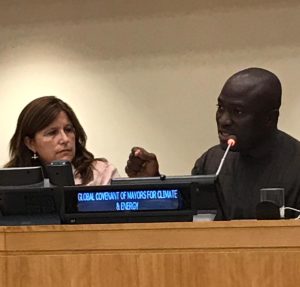Over 10,000 cities of the Global Covenant of Mayors have committed to focusing on achieving air quality that is safe for citizens and to aligning climate change and air pollution policies by 2030.
Mayor of Accra Mr Mohammed Adjei Sowah made the announcement on behalf of the GCoM, the largest global alliance for city climate leadership, at an event by the coalition on Social and Political Drivers of Climate Action leading up to the Climate Action Summit on Monday.
“To help cities who have individually made this commitment, GCoM and the WHO have collaborated on a technical assistance package, which brings together existing resources amongst city networks, and will identify needs for additional support to help cities reach these air quality goals,” said Mayor Sowah at the Climate Action for Health: Cut Emissions, Clean Our Air, Save Lives event.
GCoM’s 10,000 city and local government members hail from six continents and 139 countries, which collectively represent more than 800 million people.
The GCoM announcement is in line with a call to governments at all levels by various UN agencies to commit to air that is safe to breathe, implement and align air pollution and climate policies by 2030, track the health impacts of these policies and report on progress, experiences and best practices on platforms like BreatheLife.
Part of the “health commitment“, it is one of two commitments shaped by the WHO and partners as part of the Social and Political Drivers Coalition– one of nine multi-stakeholder groups tasked with developing “initiatives that demonstrate major shifts towards carbon neutrality by 2050 in the economy or provide credible solutions to lower the financial and social costs of transition in support of enhanced actions by countries”.
The coalition is led by the Governments of Peru and Spain, the WHO, the UN Department Economic and Social Affairs and the International Labour Organization, and tasked with developing initiatives to improve health, reduce inequalities, promote social justice and maximize decent work opportunities, while protecting the climate.
The clean air commitment is premised on the fact that the same human processes that cause global warming also produce air pollution: emissions from burning fossil fuels cause respiratory and heart disease, stroke, lung cancer, and affect every organ in the human body.
Air pollution kills more than 7 million people every year, about one in eight deaths worldwide, and causes long term health harms, like chronic lung and heart disease and cancer.
But the health effects of climate change itself extend much further, encompassing a range of direct and indirect impacts, such as exacerbating the risks of infectious disease such as malaria, dengue, Zika, and cholera, and fuelling extreme weather events that destroy lives and livelihoods and have potentially long lasting consequences for mental health.
“Our message to the world is that the climate crisis is a health crisis. Health is also a powerful argument for why we need to act now,” said WHO Director-General, Dr Tedros Adhanom Ghebreyesus.
Connecting the dots across conventional silos has been a common thread in discussions ahead of the Climate Action Summit, as subnational governments from all major regions discuss climate action in the context of health, equality and social justice, among other sustainable development links.
It is now well-recognized that action in cities will be increasingly important: by 2050, over two-thirds of the world’s population will live in urban areas, up from half now, and they are responsible for three quarters of energy-related carbon emissions.
